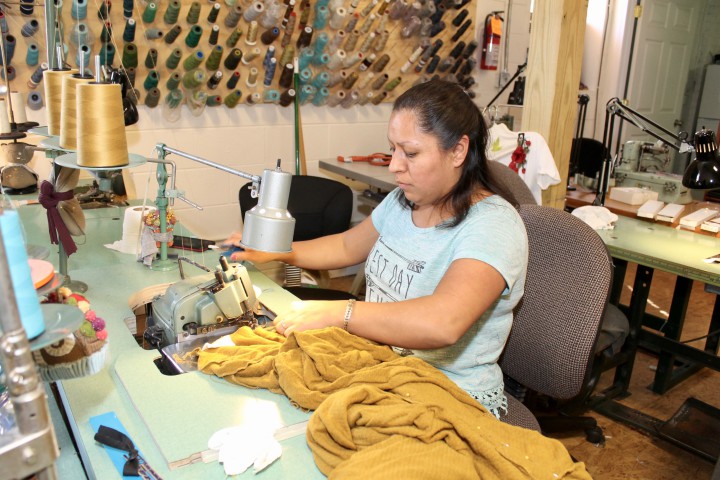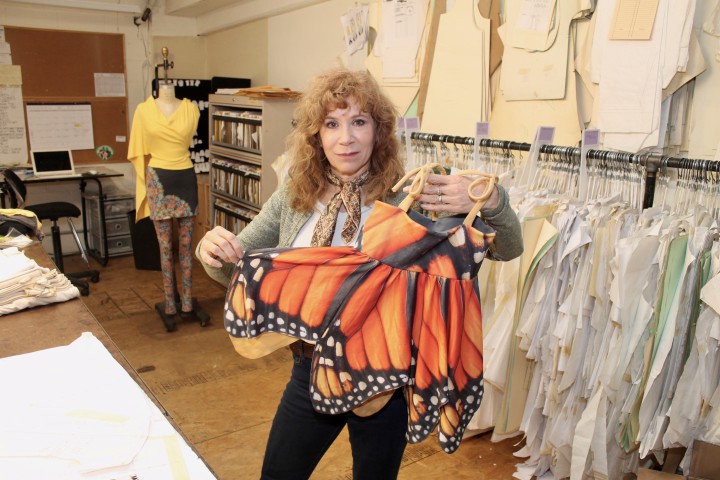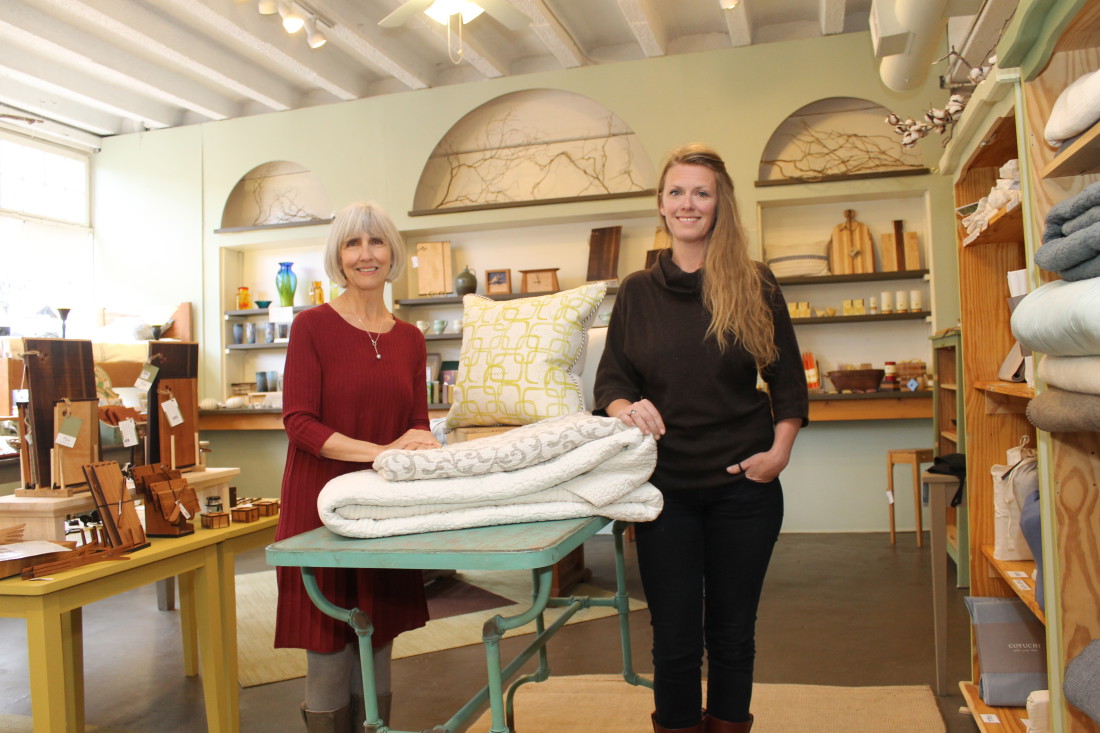When Sarah Easterling was pregnant with her first child 11 years ago, she was determined to find the purest products available to clothe and care for her son.
“Infants, their bodies are are so small and they’re so vulnerable,” she says. “They are already subjected to so much. I felt like as much as I could do to lessen my baby’s exposure to chemicals would be beneficial, and conventional cotton is just grown with so many pesticides. And for a baby, the less exposure the better.”
So Easterling spent hours and hours online shopping for organic clothing, bedding, nontoxic toys and other items deemed safe.
“What I found was that every item came from a different website,” Easterling says. “It was really hard to find multiple items in one place. And so we decided that we would open a store where you could find everything you would need to have a healthy environment for your baby and family.”
The fruit of that idea is Nest Organics on North Lexington Avenue in downtown Asheville, owned by Easterling and her mother, Truly Ball. They are among the growing number of area entrepreneurs seeking business opportunities that promote sustainable living.
Ball said that about 60 percent of the items in their store are produced locally. “They are sewn locally by lots of artisans — even our children’s clothes and accessories and home goods,” she says. Fabric comes from one of the country’s few organic cotton mills, located nearby in Greenville, S.C. “Having something like that so close is so rare and unusual,” she says. “So we source as many products as we possibly can locally.”
“Our focus has been on trying to sustain the local economy,” Ball says. “And most of these sources that we are getting are just like mothers at home who are sewing. So we help design the clothes, and they sew them for us. Then we have a lot of organic bedding and mattresses that have no chemical flame retardants. Our organic pillows are made in Burnsville. We have handmade quilts that are local, along with dresses, toys and blankets.”
Because growing conventional cotton is so prone to infestations of insects and disease, farmers typically use a lot of chemicals to keep the pests at bay.
Ball says growing organic cotton requires the use of natural predators and intercropping (growing two or more crops in proximity) to control the pests. And most conventional cotton is finished with formaldehyde and other chemicals designed to make it free of wrinkles — substances that can contaminate water supplies, she says. “With organic cotton you can’t use any of that, and it doesn’t go into the groundwater, and workers are not exposed to it.”
Ball says that while there are no studies that directly link negative health effects to exposure to conventional cotton, there’s no reason to take a chance. “It’s just kind of common sense,” she says. “You don’t want babies and children exposed to formaldehyde and chemicals in something so close to their skin. There are lot of things out there that haven’t been tested. If you can, you should just avoid chemicals.”
Ball says Nest Organics also holds classes to educate people about the hazards of some chemicals and the concept of sustainability.
“There are so many levels to sustainability,” she says. “So we really are trying just as much as possible to promote local, being part of locally grown.
“Our continued mission is to find products that have a softer footprint,” Ball says. “We have toys that are made of recycled milk cartons. We have products that avoid plastic and products that a person can reuse again and again. The average consumer doesn’t think about the impact of every step of production of a product on the environment.”

Natural animal fiber used in production
Echoview Fiber Mill near Weaverville makes clothing, blankets, decorative pillows, dryer balls and other items carried by retail outlets like Nest Organics. There’s also a retail store at the mill. The facility is Gold LEED certified by the U.S. Green Building Council because of its energy efficiency, according to Allyson Ansusinha, a product developer and designer at the company. It features 193 solar panels that provide about half the mill’s power as well as geothermal wells used to heat water.
Echoview Fiber Mill has a large, flatbed knitting machine that makes fabric yardage and can also knit pieces for garments in specified shapes and patterns so the pieces don’t have to be cut out, Ansusinha says.
“We are able to bring in raw fiber and take that from fiber to yarn to knitted products,” she says. “There is a small amount of waste created in the production process, but we save that and reincorporate it into other products so that we can kind of close the loop. We use a lot of natural animal fibers, especially alpaca, because we’ve noticed there is a lack of American alpaca yarn and blends on the market today. There’s a lot of Peruvian alpaca, which is really beautiful and high quality, but the carbon footprint of bringing that fiber all the way from South America is pretty big. So while we do use Peruvian alpaca, we’ve been developing our own alpaca yarn using fiber from American farms and co-ops here.”
Echoview also includes a farm that has 17 alpaca, and the wool is used for hand knitting, Ansusinha says.
Ansusinha has developed a line of women’s clothing that she showed recently at Charleston Fashion Week in South Carolina. “The concept behind the utility of the clothes is that they are kind of flexible in their fit so that they’re made for women to wear through many stages of their lives,” she says.
The mill, which is living-wage-certified, employs 12 people, Ansusinha adds.
“We all care so much about the environment,” she says. “We just have this one Earth. And so we have our mission to create products that have a low impact or even a positive impact on the environment for people to live with. Consumerism is rampant, so we have our mission to be a better option for people. We know consumerism is never going to go away in our lifetime, so how can we contribute products that are long-lasting and good for the Earth and also for people?”
Ansusinha concludes, “A really important part of what we do is that we have a clean and healthy work environment and happy employees, and we’re not overworking or underpaying people.”

A butterfly becomes a design inspiration
Marylou Marsh was at the cutting edge of making clothing from organic cotton when she helped found a company called Ecosport in New Jersey in 1989, she says. The operation later moved to Asheville under the name Spiritex, with a manufacturing plant in the former Burlington Industries building on Riverside Drive in Woodfin and a retail shop on Haywood Street downtown.
Marsh employs two seamstresses full time along with a “cottage industry” of women sewing at home to make clothing she designs. She describes how a butterfly became the inspiration for one of her designs.
“I found a dead butterfly totally intact,” Marsh says. “I brought it home and I photographed the wings. Then I blew it up to different wing sizes to accommodate my designs. It becomes a skirt or a dress.”
Marsh says she tries to make her designs unique but also wants them to be wearable. “We try to avoid trends because it becomes outdated,” she says. “We do the production of the garments, the production of the fabric, the finishing of the fabric.”
That makes Spritex “total vertical,” Marsh continues, referring to the company handling each aspect of production. “From the fiber to the finished garment, we’re totally vertical. We oversee the whole production. It’s all made in the U.S. We’ve always felt that was more sustainable from the carbon footprint aspect.”
Marsh says she doesn’t use conventional cotton because growing it can contaminate groundwater,” she says.
“You want to do organic cotton because you won’t have the herbicides, pesticides and fungicides in your water,” Marsh says. “Eventually it could end up in your food supply. It’s a way of doing things that’s more in unison with nature.”



Before you comment
The comments section is here to provide a platform for civil dialogue on the issues we face together as a local community. Xpress is committed to offering this platform for all voices, but when the tone of the discussion gets nasty or strays off topic, we believe many people choose not to participate. Xpress editors are determined to moderate comments to ensure a constructive interchange is maintained. All comments judged not to be in keeping with the spirit of civil discourse will be removed and repeat violators will be banned. See here for our terms of service. Thank you for being part of this effort to promote respectful discussion.